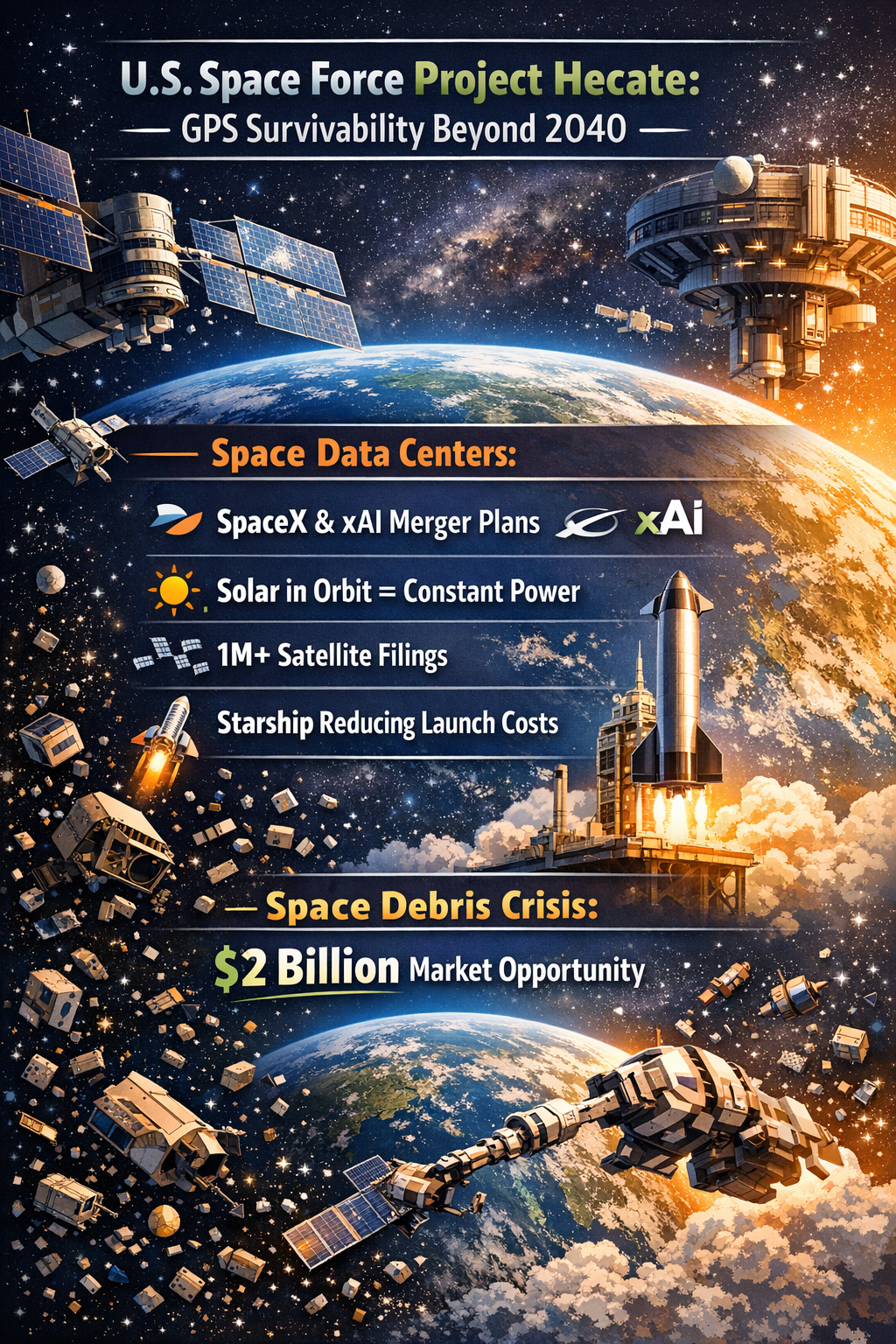Global Scans
·
Space
·
Intelligence Briefing

Intelligence Briefing about Space
Key Emerging Trends
- Advancements in Space Propulsion and Materials: Iodine propulsion is emerging as a cost-effective alternative to xenon, with abundant supply potentially meeting future space industry demands (spacewar.com).
- Expansion of Space-Based Data Infrastructure: Initiatives like HYPER leverage global satellite ground networks, combining polar stations to enhance data relay and connectivity (spacewar.com).
- Growth of AI and Edge Computing in Space: AI-enabled spatial intelligence is being deployed for GNSS-denied environments, enhancing operations in contested or remote areas (spacewar.com).
- Shift Towards Smaller, Specialized Space Stations: NASA is retiring the ISS to focus on smaller stations near the Moon and Mars, aligning with ambitions for lunar settlements and crewed deep-space missions (cnbc.com), (thehotelwashington.com).
- Commercialization and IPO Activity: SpaceX’s impending IPO signals increased private investment interest, potentially accelerating innovation and competition (cryptobriefing.com).
- Space-Based Data Centers and Renewable Power: Companies are exploring orbital data centers powered by solar energy, promising greater efficiency and reduced terrestrial environmental impacts (fieldfisher.com), (theregister.com).
- Geopolitical Rivalry and Strategic Competition: Concerns over China’s accelerating lunar program challenge NASA’s Artemis mission timelines, intensifying space race dynamics (wired.com).
- Improved Space Weather Forecasting: New frameworks enable longer lead times to safeguard satellites and infrastructure, critical for operational resilience (miragenews.com).
- Connectivity Expansion to Remote Regions: Satellite internet aims to bridge digital divides, enabling economic participation in underserved regions such as rural Africa (vodafone.com).
- Ensuring GPS and Navigation Survivability: The U.S. Space Force’s Project Hecate focuses on maintaining GPS capabilities beyond 2040, reflecting concerns over navigational resilience (keeptrack.space).
Challenges, Opportunities and Risks
- Challenges: Accelerated geopolitical competition risks militarization and strategic instability in space; high costs of lunar and Mars missions strain budgets; reliance on emerging propulsion and AI technologies introduces operational uncertainties.
- Opportunities: Private sector IPOs and space-based infrastructure present growth avenues; AI-powered spatial intelligence can unlock new operational capabilities; satellite connectivity could transform global digital inclusion.
- Risks: Supply chain limitations or failures in newer propulsion methods; vulnerabilities in GPS systems and communication networks to outages or cyber threats; environmental impacts of expanding space infrastructure.
Scenario Development
- Best-Case: Collaborative international efforts lead to the successful establishment of lunar and Martian outposts; AI and iodine propulsion mature rapidly; space-based data centers become mainstream, delivering sustainable, resilient infrastructure supporting global digital equity.
- Technological Competition Dominates: Private sector innovation accelerates through IPO funding and AI breakthroughs; space data networks expand but geopolitical tensions over lunar and orbital domains intensify, prompting defensive postures and fragmented governance.
- Geopolitical Stalemate: Rivalry between China, the U.S., and allies slows joint missions; Artemis experiences delays; GPS survivability projects become critical as counterspace threats escalate; space infrastructure growth is cautious and regionally siloed.
- Worst-Case: Military escalation in space leads to debris proliferation and communication blackouts; key propulsion and AI technologies underperform; digital divides widen as satellite infrastructure faces neglect or disruption; lunar ambitions falter due to cost overruns and political shifts.
Strategic Questions for Senior Advisors
- How can national space strategy balance accelerating technological innovation with the prevention of militarization and space debris risks?
- What models of international collaboration could enhance shared governance and resource management in lunar and deep-space activities?
- How should investments be prioritized between commercial space infrastructure, AI-enabled resilience, and traditional space exploration?
- What contingencies need to be developed to safeguard navigation and communication systems against emerging physical and cyber threats?
- How can space-based connectivity initiatives be leveraged to address critical digital equity gaps without exacerbating geopolitical tensions?
Actionable Insights for Strategic Decision-Making
- Organizations could explore partnerships with private space firms to accelerate technology adoption and share risks in propulsion and AI development.
- Policymakers could consider frameworks that incentivize multi-lateral cooperation, reducing duplication and fostering sustainable space governance models.
- Investing in space weather forecasting and GPS survivability programs could enhance resilience of critical infrastructure against increasing threats.
- Strategic allocation of resources towards space-based data centers might provide competitive advantages in energy efficiency and operational sustainability.
- Prioritizing inclusive connectivity initiatives can open new economic frontiers, but could require diplomatic efforts to manage regional sensitivities.
Briefing Created: 02/03/2026